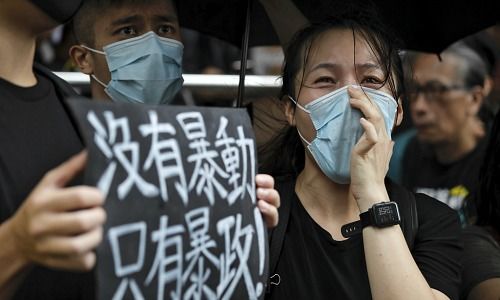The Dramatic Story of Hong Kong, Told Differently
Hong Kong is like a kite swerving and surging in the sky. You must be able to see the winds, to tell the kite’s fate – finews.asia invited an Asian family office to share its reading of the current uncertainties in Hong Kong right now. The writer requested its name be withheld from publishing.
The three parts of Hong Kong, namely the Hong Kong Island, Kowloon, and the New Territories were ceded to Britain in 1842, 1860, and 1898. Through the following decades, not much happened. Hong Kong remained a fishing village and minor trading port, until the 1930s. The Sino-Japanese War, the Chinese civil war from 1945-1949, and the subsequent turmoils and famines in 1950s~1960s on the Chinese mainland caused a sustained exodus of people to Hong Kong.
These refugees, be it rich capitalists traveling with their textile machinery or poor peasants making the trip on foot, found in Hong Kong a relative haven. Interestingly, the most privileged refugees from China included the predecessors of what is known today as HSBC, Standard Chartered, AIA, Jardine Matheson, etc.
An Identity of «Exceptionalism» Was Formed
In the late 1970s, with the gradual opening of China, Hong Kong began its booming era. With its free-port status, English-law jurisdiction, light-touch regulations, and an economic system that rewarded successes and punished failures swiftly, Hong Kong have seized almost every opportunity presented by China’s rapid embracing of global commerce and finance.
In the process, an identity of «exceptionalism» was formed in the Hong Kong people. They believe they are the lucky ones among the ethnic Chinese and such luck has been earned with sweat and grit, ounce by ounce. Their love of money and property are well known, but their virtues of fairness, decency, stiff upper lips, and the ability to laugh at oneself are less celebrated.
To understand Hong Kong and Hong Kongers’ stridency, this collective sense of exceptionalism should be factored in.
The Handover in 1997
Contrary to what many commentators alleged, the return of Hong Kong to Chinese sovereignty was predestined when Deng Xiaoping in 1982 made it crystal clear to Margaret Thatcher that, however, the Sino-British negotiations might evolve, China would reclaim the whole of Hong Kong in 1997, at whatever costs. The intimation that the negotiations were not handled in the best way or there were levers that could have been pulled, was probably an illusion.
When Deng proposed that the status should be maintained for 50 years after 1997, he didn’t imagine it would be perceived as a clock ticking away, at all. He mused that by 2047 China and Hong Kong should have converged on almost every aspect. To many Hong Kongers, the convergence hasn’t truly happened (save GDP per capita), and the ticking becomes louder every year.
«Fortune» magazine in 1995 announced the «Death of HK». But 24 years since the gloomy prophecy, Hong Kong has largely retained the key elements of what made it special. This statement, however, is not an unqualified endorsement. The problems already apparent during the colonial era - land sale as key government revenues, laissez-faire system neglecting the bottom rung, a highly cyclical economy – remained unresolved after 1997, and became even more entrenched.
The Unrest, and How it Will End
There are many versions of what has happened and why it has happened. But everyone is shocked by the intensity and unpalatability of the protests. The situation may seem to be in a downward spiral, but the city is still on a very firm footing. Shopping, stock-brokering, and the vibrant nightlife carry on.
The prospect of a certain type of tracked vehicles lumbering through Hong Kong streets is definitely exaggerated. Unknown or unacknowledged by many people, Hong Kong carries its own insurance. In the past 18 months, Hong Kong’s importance actually increased, not decreased, to China.
Bankers at morning calls debate the ending. No one is sure. The default scenario is that the furor will fizzle and the Hong Kong government will find a way to reboot, and repair. The longer-term is harder to tell. Hong Kong is like a kite swerving and surging in the sky. You must be able to see the winds, to tell the kite’s fate.
What Do All These Mean For Private Banks?
Unlike all other branches of financial services, private banking was born for wealth in paranoia. Private banks and family offices in HK get busier, not slacker, while the street battles are fought. There are many reports of significant outflows to Singapore and Europe, but this trend started more than 10 years ago, not recently.
Exactly because private banking can provide «advisory in proximity but booking at a distance», Hong Kong as a hub for meetings and paper-signing will not change, but the global custody will be demanded by more and more Greater China clients.
A large Swiss private bank which intended to close its Zurich desk serving Asian clients is thinking again; a medium-sized Swiss private bank no longer plans to build Hong Kong booking capabilities; EAMs are applying to set up MAS-licensed entities, and insurance broker firms are being bought with a renewed relish. The events of Hong Kong have thrown in sharp relief the nature of our business, and the world we operate in.



























